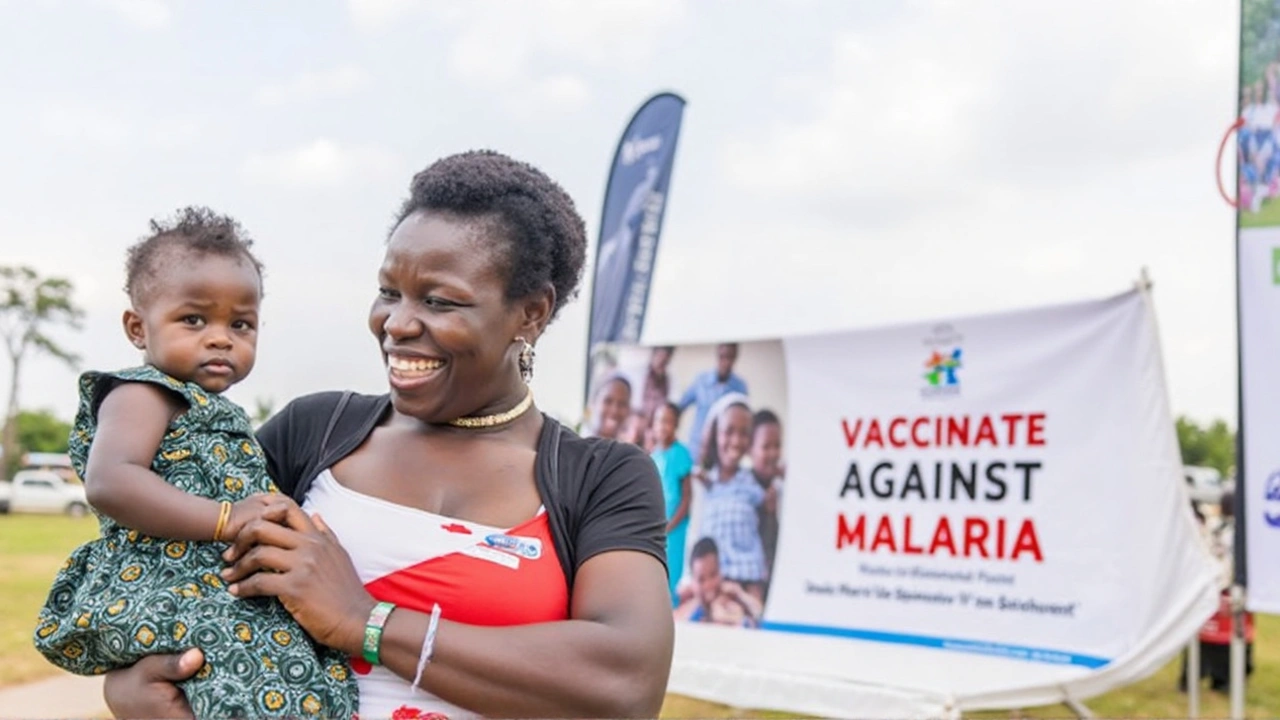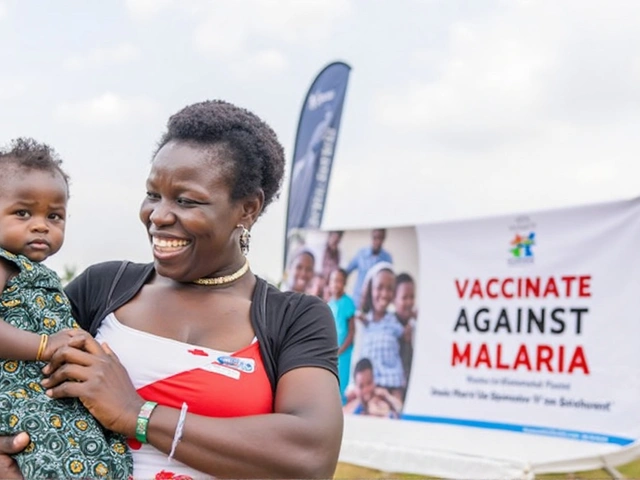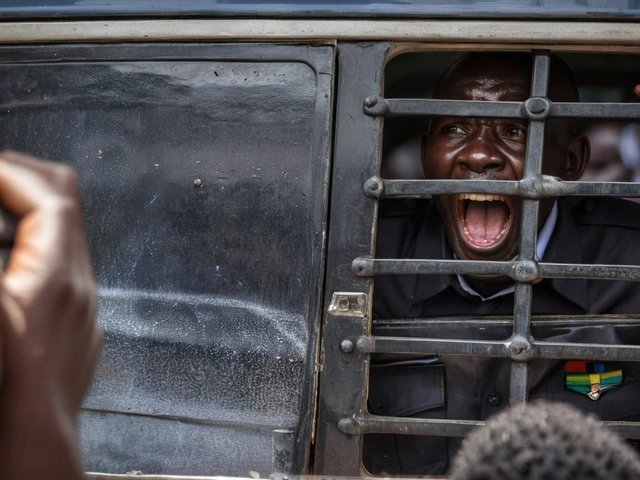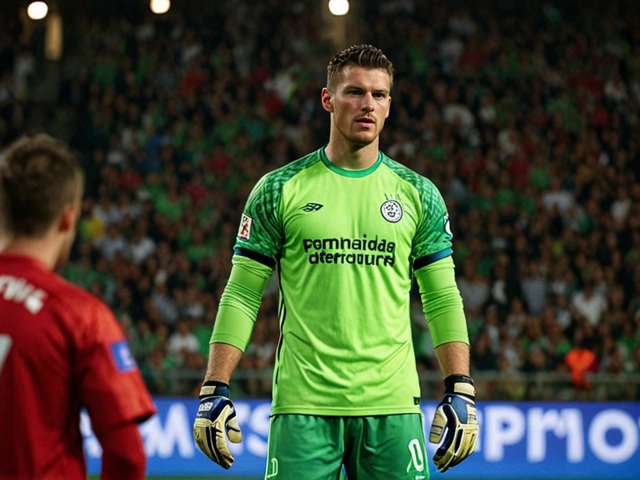
In a bold move against one of the continent's deadliest diseases, Uganda has embarked on Africa's largest malaria vaccine introduction. On April 2, 2025, the country began administering the R21/Matrix-M vaccine, which targets 1.1 million children aged under two across 105 districts plagued by high to moderate malaria transmission.
A Coordinated Effort to Combat Malaria
This major initiative is the result of a collaboration involving Gavi, the Vaccine Alliance, the World Health Organization (WHO), UNICEF, PATH, and the Clinton Health Access Initiative (CHAI). Their combined efforts have propelled Uganda to become the 19th African nation to adopt the revolutionary vaccine, integrating it into the routine immunization schedule. The R21/Matrix-M vaccine requires a meticulous schedule of four doses, administered at the ages of 6, 7, 8, and then 18 months.
The significance of this rollout is underlined by Uganda's staggering malaria statistics: it remains the leading cause of illness and death among children. In 2023 alone, the country saw 10.9 million cases resulting in 3,582 fatalities, a stark reminder of the disease’s toll.
Frontlines of the Battle
The campaign kicked off in Apac District, infamous for its heavy mosquito burdens, with individuals experiencing around 1,500 mosquito bites each year. Such exposure places its residents among the most vulnerable worldwide.
To maximize the impact, the Ministry of Health has been bolstered by the Malaria Consortium. They're rolling out extensive health worker training, strengthening healthcare systems, and implementing community awareness campaigns even in local languages like Karamojong. This aligns with Uganda's larger malaria chemoprevention efforts, working in tandem with widespread prevention measures such as insecticide-treated nets.
The vaccine rollout is bolstered by securing 3.5 million doses, with 2.278 million already deployed to districts nationwide. But health experts stress the necessity of completing all four doses for full protection.
Dr. Sania Nishtar, CEO of Gavi, lauds the vaccine's proven safety and its potential for widespread efficacy, urging continuous funding to sustain the gains. Meanwhile, Dr. Robin Nandy from UNICEF emphasizes the continued importance of combining vaccine introductions with other preventive measures.
Globally, the R21/Matrix-M vaccine has shown remarkable results—75% efficacy in environments with seasonal transmission. Previous deployments in countries such as Ghana, Kenya, and Malawi yielded a 13% reduction in child mortality, setting the stage for successes expected in Uganda.
Following this historic launch, Uganda's efforts are part of a broader African strategy. Fourteen other countries had already started their vaccination programs in 2024, and expansion plans include introducing the vaccine to countries like Mali and Ethiopia in the coming years.
Parents play a critical role in ensuring their children receive all necessary vaccine doses. This move also complements other health interventions like indoor spraying, underscoring Uganda's commitment to not just combatting malaria but also safeguarding its future generations. With 14 vaccines now in the country’s immunization portfolio, Uganda stands as a leader in comprehensive child health strategies across Africa.







In the quiet moments before dawn, the specter of malaria looms like an unseen tide, and Uganda’s new vaccine rollout feels like a lighthouse cutting through the night. The resolve here is nothing short of heroic, a reminder that hope can be inoculated.
Wow!!! This is absolutely electrifying news!!! 🌟 Uganda is taking a massive leap forward, and every child protected feels like a victory dance!!! 🎉 Let’s keep that energy blazing, and cheer on the health workers doing the heavy lifting!!! 🙌🏽💪🏽
Oh great, another vaccine rollout-because apparently the mosquito decided to take a vacation and left the kids alone. Sure, four doses sound like a party schedule, but who needs extra appointments when you’ve got a buzzing playlist of bites? Anyway, kudos to the folks who actually think this will make a dent.
First off, the article should have said “administered” instead of “administering”-precision matters! Secondly, the hype around “75% efficacy” ignores the harsh reality that any number below 100% leaves doors open for tragedy. Stop sugar‑coating the struggle; we need relentless follow‑up, not just applause.
That rollout hits the sweet spot.
Yo, massive props to the teams on the ground-training health workers and rolling out doses isn’t a walk in the park. It’s cool to see community outreach in local languages like Karamojong; that’s the kind of grassroots hustle that actually sticks. Let’s make sure the supply chain stays solid so those four shots don’t get lost in paperwork.
The integration of the R21/Matrix‑M vaccine into Uganda’s routine immunisation schedule represents a paradigm shift in the continent’s public‑health architecture.
By aligning the four‑dose regimen with existing touchpoints at 6, 7, 8 and 18 months, the programme leverages already‑established service delivery platforms, thereby minimizing incremental logistical overhead.
Moreover, the partnership matrix-Gavi, WHO, UNICEF, PATH, CHAI-creates a multilayered safety net that buffers against funding volatility and operational bottlenecks.
From an epidemiological standpoint, achieving 75 % efficacy in a high‑transmission setting translates into a substantial reduction in the basic reproduction number (R0), which in turn depresses malaria incidence curve.
When combined with vector control measures such as insecticide‑treated nets and indoor residual spraying, the synergistic effect is expected to outpace what each intervention could accomplish in isolation.
The data from Ghana and Kenya, where a 13 % drop in child mortality was observed, provide a compelling empirical precedent for the Ugandan context.
Children under two are the most vulnerable demographic, and safeguarding them early not only saves lives but also preserves human capital for future economic development.
Community engagement in native tongues, like the Karamojong outreach, enhances vaccine acceptance by addressing culturally specific myths and misconceptions.
Health‑worker training modules, now being standardized across 105 districts, will elevate the quality of service delivery and ensure cold‑chain integrity for the biologics.
The procurement of 3.5 million doses, with over two million already dispatched, demonstrates a robust supply‑side commitment that must be matched by demand‑side vigilance.
Ensuring completion of the full four‑dose series is critical; partial immunisation only yields sub‑optimal protective thresholds.
Digital tracking tools could be deployed to send reminders to parents, thereby boosting adherence rates and reducing missed appointments.
Financial sustainability will hinge on continued donor support, but also on integrating the vaccine cost into national health‑budget line items for long‑term resilience.
If Uganda sustains this momentum, the model can be exported to neighboring Mali and Ethiopia, catalyzing a regional wave of malaria eradication initiatives.
In sum, this is more than a medical intervention; it is a bold statement of agency, a testament to collaborative governance, and a hopeful beacon for generations to come.